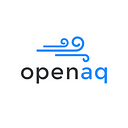Hello everyone!
We want to provide an update to the community on recent work that’s been happening on the software side, as well as let you know of an upcoming potential brief period of downtime along with an API change.
First, an overview of what we’ve recently been working on!
Metadata editor
- Metadata are coming to OpenAQ! Additional information about where and how measurements are being captured will enable a lot more diverse and powerful analyses by the OpenAQ community, in particular scientists.
- The metadata editor allows anybody to provide additional information about stations and the instruments in them. You can read more about the purpose of this editor here.
- Editing is open to everybody, but the editor does require you to sign up for a user account. We remain an open and welcoming community but want to put up some safe-guards against vandalism.
- You can see the code that will be implemented here.
Unique ID
- From now on, stations will be identified with a unique and persistent ID. This allows us to better track measurements over time, even if the data contributor changes the name of a location. You can read more about the purpose of the Unique ID system here.
API updates
- We have added a new endpoint to the API that provides locations and their metadata. All known metadata for a location can be retrieved through this endpoint: https://api.openaq-staging.org/v1/locations/{id}
- We are removing the nearest parameter.
We’d like to specifically call out the removal of the nearest parameter. It has been deprecated for some time, but with this update, we will be removing it. You can use: order_by=distance&radius=DISTANCE_VALUE&limit=LIMIT_VALUE as an alternative to get the same data.
We will be deploying the API changes the morning (eastern US time) of September 23. There should not be any downtime, but there are a number of moving pieces, so we just want you all to be aware of the date in case you notice any odd behavior.
We’re very excited about these changes, the performance benefits they bring, and the groundwork they lay for future platform expansion. Thank-you to the IntelliAQ team (a project funded through grant agreement No 787576 by the European Research Council under the European Union’s Horizon 2020 research and innovation programme, Principal Investigator Dr. Martin Schultz) at Forschungszentrum Jülich for funding and collaboration on the metadata and universal ID projects. Big thanks also to Development Seed, who has worked with us to build these new systems. Thanks also to many of you in the community who have contributed ideas, comments, and feedback on these new systems over the past few months.
If you have questions on these changes, a great place to reach out is the OpenAQ Slack Channel on #dev. If you’re not already on there, you can join here!
